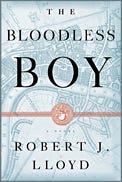The Bloodless Boy opens on New Year’s Day, 1678, in London. The body of a young boy, drained of his blood, is discovered in the snow on the bank of the Fleet River. Harry Hunt accompanies Robert Hooke, the Curator of Experiments of the Royal Society for the Improving of Natural Knowledge, to the scene. Hooke has been asked take charge of the body and investigate whether it might be part of a plot against King Charles II. Harry, now Hooke’s assistant rather than his apprentice, is still wavering between an apprentice’s habit of obedience and an assistant’s new-found sense of mastery.
England in 1678 is also wavering. The rationality of the scientific revolution has not displaced hoary superstitions exacerbated by recent upheavals—a Civil War, a king’s execution, the fall of Cromwell, and the return of Charles II, not to mention the Great Fire of London whose traces still mark the city. The men of the Royal Society enthusiastically immerse themselves in the experimental method, aided by new systems of classification for ordering the knowledge gained thereby. Meanwhile, the populace seethes with far-fetched rumors of conspiracies and plots they suspect are being concocted by subversive Catholics. Hooke and his fellow members of the Royal Society whisk the bloodless boy to a vacuum chamber in their laboratory where the corpse can be preserved while they investigate. They are soon warned off, but Harry, struck with sympathy for the mysterious boy, continues investigating, his naïve self-confidence plunging him into one danger after another.
Readers who enjoyed Neal Stephenson’s Quicksilver trilogy and Ian Pears’ An Instance of the Fingerpost will find The Bloodless Boy a similarly creepy, thrilling, intelligent and impeccably researched portrait of the seventeenth-century birth of science. This is fiction, to be sure, but most of the principal characters are based on real people, vividly portrayed: Robert Hooke, Henry Oldenburg, John Locke, King Charles II, and others whose philosophical inquiries and scientific research laid the groundwork for the society we live in today. It’s a fascinating read. (2013 & 2021, 400 pages including an Author’s Note separating fact from fiction and a Bibliography of source materials)




